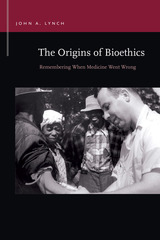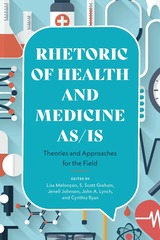3 books by Lynch, John A.

The Origins of Bioethics
Remembering When Medicine Went Wrong
John A. Lynch
Michigan State University Press, 2019
The Origins of Bioethics argues that what we remember from the history of medicine and how we remember it are consequential for the identities of doctors, researchers, and patients in the present day. Remembering when medicine went wrong calls people to account for the injustices inflicted on vulnerable communities across the twentieth century in the name of medicine, but the very groups empowered to create memorials to these events often have a vested interest in minimizing their culpability for them. Sometimes these groups bury this past and forget events when medical research harmed those it was supposed to help. The call to bioethical memory then conflicts with a desire for “minimal remembrance” on the part of institutions and governments. The Origins of Bioethics charts this tension between bioethical memory and minimal remembrance across three cases—the Tuskegee Syphilis Study, the Willowbrook Hepatitis Study, and the Cincinnati Whole Body Radiation Study—that highlight the shift from robust bioethical memory to minimal remembrance to forgetting.
[more]

Rhetoric of Health and Medicine As/Is
Theories and Approaches for the Field
Lisa Melonçon, S. Scott Graham, Jenell Johnson, John A. Lynch, and Cynthia Ryan
The Ohio State University Press, 2020
The rhetoric of health and medicine (RHM) is a growing and vibrant area of inquiry incorporating scholars working across a variety of fields and disciplines. While this makes it a source for rich and innovative scholarship, this emerging field is in need of a guiding text that can bring together the disparate work spread across multiple disciplines and institutional spaces. Rhetoric of Health and Medicine As/Is: Theories and Approaches for the Field answers this call by providing an in-depth and wide-reaching analysis of the state of the rhetoric of health and medicine and offering core concepts and critical theories to ground research moving forward.
With a foreword by Judy Segal and in sections that address interdisciplinary perspectives, representations of health and illness in online spaces, and health activism and advocacy, this volume proceeds in a unique format: essays tackle these key topic areas through case studies ranging from food and its relation to public health, to apps that track fertility, to mental health and disability, to racial disparities that exist in public health campaigns about sudden infant death syndrome (SIDS). The essays within each section are then followed by responses from prominent scholars in the rhetoric of health and medicine—including John Lyne, J. Blake Scott, and Lisa Keränen—who take on the central theme and discuss how the theory or concept under study can and should evolve in the next stages of research. Unifying the essays is a consideration of RHM as a theoretical construct guiding research and thinking alongside the conceptual parameters that constitute what RHM is and can be in practice. In asking questions about the role of rhetoric—both as analytic and productive framework—in health and medicine, this volume engages with broader theoretical and ethical concerns about our current healthcare system and how healthcare and medical issues circulate in all the social, cultural, economic, and political aspects of our world.
With a foreword by Judy Segal and in sections that address interdisciplinary perspectives, representations of health and illness in online spaces, and health activism and advocacy, this volume proceeds in a unique format: essays tackle these key topic areas through case studies ranging from food and its relation to public health, to apps that track fertility, to mental health and disability, to racial disparities that exist in public health campaigns about sudden infant death syndrome (SIDS). The essays within each section are then followed by responses from prominent scholars in the rhetoric of health and medicine—including John Lyne, J. Blake Scott, and Lisa Keränen—who take on the central theme and discuss how the theory or concept under study can and should evolve in the next stages of research. Unifying the essays is a consideration of RHM as a theoretical construct guiding research and thinking alongside the conceptual parameters that constitute what RHM is and can be in practice. In asking questions about the role of rhetoric—both as analytic and productive framework—in health and medicine, this volume engages with broader theoretical and ethical concerns about our current healthcare system and how healthcare and medical issues circulate in all the social, cultural, economic, and political aspects of our world.
[more]

What Are Stem Cells?
Definitions at the Intersection of Science and Politics
John Lynch
University of Alabama Press, 2011
Normal0falsefalsefalseEN-USX-NONEX-NONEMicrosoftInternetExplorer4
In recent years political, religious, and scientific communities have engaged in an ethical debate regarding the development of and research on embryonic stem cells. Does the manipulation of embryonic stem cells destroy human life? Or do limitations imposed on stem cell research harm patients who might otherwise benefit?
John Lynch’s What Are Stem Cells? identifies the moral stalemate between the rights of the embryo and the rights of the patient and uses it as the framework for a larger discussion about the role of definitions as a key rhetorical strategy in the debate. In the case of stem cells, the controversy arises from the manner in which stem cells are defined--in particular, whether they are defined with an appeal to their original source or to their future application. Definitions such as these, Lynch argues, are far more than convenient expository references; they determine the realities of any given social discourse.
Lynch addresses definitions conceptually--their stability in the face of continual technological innovation, their versatility at the crossroads of scientific and public forums, and their translations and retranslations through politics. Most importantly, his work recognizes definitions as central to issues, not only within the topic of stem cell research, but also in all argumentation.
[more]
READERS
Browse our collection.
PUBLISHERS
See BiblioVault's publisher services.
STUDENT SERVICES
Files for college accessibility offices.
UChicago Accessibility Resources
home | accessibility | search | about | contact us
BiblioVault ® 2001 - 2024
The University of Chicago Press









